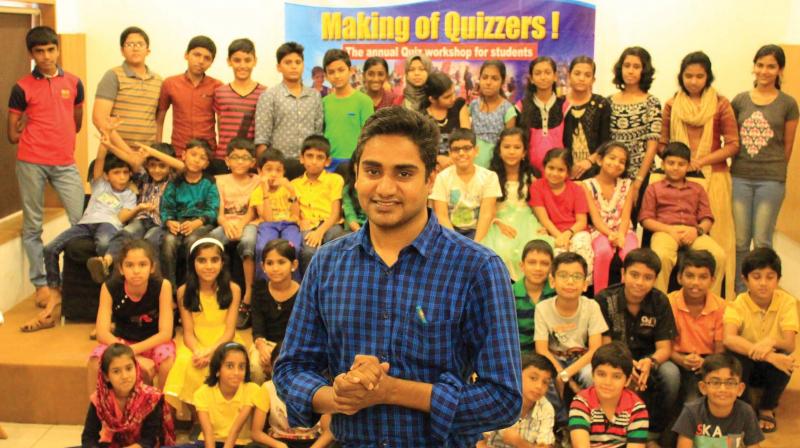Quiz whiz
Snehaj Srinivas views quiz as something that helps improve problem solving and analytical skills and not just a platform for information

The cricket match was between India and Pakistan. Held in Sialkot, Pakistan, in the year 1984. It was the second ODI of a three-ODI and three-Test tour of India in Pakistan. Pakistan had won the first ODI, and the first two tests were drawn. The second ODI, therefore, was crucial. But halfway through, it was cancelled. The Indian team came back home. Why, asks Snehaj Srinivas, quiz researcher, master for 16 years. When someone answers ‘don’t know’, he asks to check the facts again — the year for instance. Then it comes, the informed guess — Prime Minister Indira Gandhi’s assassination. “Yes, why else would a match of such significance be called off in the middle? Unless something that serious happens? In this way, framing the questions in a quiz can be an art, creative,” Snehaj says, with his years of experience and research. As part of his many efforts, the first inter quiz club championship of Kerala took place in Kozhikode on Sunday. “We have very few active quiz clubs in the state. This is one way to encourage more clubs to be formed, and also to identify them.” Quiz is still used to observe days of importance, like a health quiz for World Health Day. And sometimes, as a tool to spread awareness.
“The RBI, for instance, wants to promote financial literacy among students, the health department wants students to be aware of the different illnesses and immunizations.” Snehaj’s is not a story you’d expect — of a studious child who was a quizzing whiz. He hardly took part in a quiz in schooldays. The interest developed much later, in his college days. “It was the time of the internet boom, and with a few of my friends I had opened a computer centre. One day while going to the centre in a bus, I bought a GK book for Rs 10. I was intrigued by what I read. I went to the computer centre and asked the questions to my friends. They too got interested. For the next few months we kept on buying these books, reading, quizzing each other. We started watching quiz shows and followed quiz master K.P. Sunil. That’s the time I realised I knew so little about what was happening around me — in my panchayat, my state.”
By then he had finished his graduation in Chemistry and joined for PG. But the quizzing continued. He started taking part in quizzes, getting zero points at first, learning, and getting more, till a year later, he was winning. People started calling him to conduct quizzes. The computer centre changed into a quizzing entity. It got registered in Kozhikode and a little later in Singapore. They called it Dreamz, inspired by the words of Abdul Kalam. “But now we are more known as QuizKerala.” A lot of civil officers — including ‘Collector Bro’ N. Prashanth — joined their monthly events. “But by then quizzing had lost the importance it enjoyed in the Doordarshan-only days when Siddharth Basu had made it so popular. That faded with multimillionaire shows coming on television. A lot of people think today that quizzing means Kaun Banega Crorepati and ask you for multiple-choices to answer a question.”
In Kerala too, there was the family tele quiz that Rekha Menon did and a reverse quiz show by G.S. Pradeep. But all that had gone away too. Snehaj wanted the quizzing culture to come back. “I want to show that it needn’t be boring. Questions could be framed to make it interesting. We have a research team of 50 to 60 people to prepare questions. From this pool, we choose questions and frame it to relate it to topics of interest for children, like music, movies or sports.” But quizzes are not always for children. There are four categories: for schools, colleges, women and then open quizzes. He needs to select a champ out of these. Here’s why.
Every year the International Quizzing Association (IQA) conducts world quizzing championship in 30 to 40 countries and Snehaj did too on the same day in Kozhikode. “We spoke to the Asian director Dr Anurakshat Gupta. He visited us and said that we can start an organisation in Kerala (for ranking and rating) and if it is successful, replicate it in other states.” So the Quiz Society of India was launched in 2013, but it had been difficult finding enough people or quizzing events to select a district or state champion. This April 20, he will conduct the first quiz in the capital, and within a month cover the state. But he has larger aims. “There are so many suicides in Kerala among the young for reasons as silly as being scolded for watching television. Children are not able to face failure, they need problem solving skills, use analytical skills. Quizzing can help a lot.”

